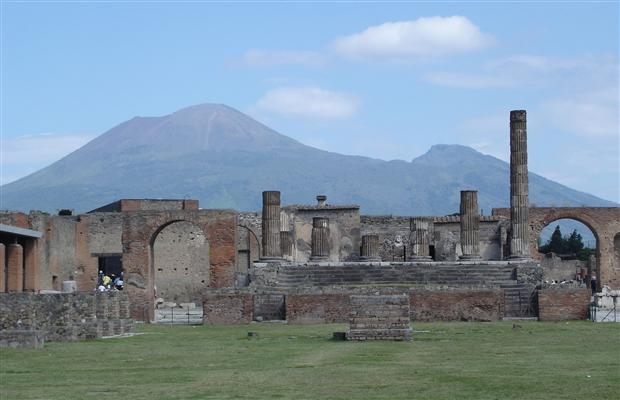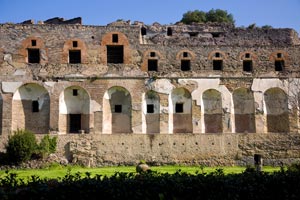
POMPEII.
YOU have all read descriptions of ancient cities, especially those spoken of 'in the Bible,’—of Babylon, Jerusalem, Nazareth, Bethlehem, and many others, all of which were in some way connected with the people of God, and so mentioned in the Scriptures. But there were in Christ's time other very large and beautiful cities. Their inhabitants were,' many of them, idolaters, and did not welcome the lowly Jesus as their Saviour.
One of these cities, called Pompeii, was especially attractive. It was in Italy, and situated at the foot of the great volcano Vesuvius. Its population numbered many thousands, and it contained buildings and palaces of the noblest structure.
Being so charmingly situated on the verge of the Great Sea, and at the entrance of a fertile valley whose lovely gardens and vineyards were ever a delight to the pleasure-seeker, it was a resort for
persons of culture and refinement from all parts of the world. There were found musicians, painters, sculptors, poets, orators, and sages; for Pompeii was a seat of learning as well as of art. Nothing was spared to make it attractive. The green slope of the mountain, even to its heights, was covered with villas, and as it towered above the city, forming so rich a back-ground, the whole scene was as
beautiful as a painting from a master's hand.
But while the inhabitants of Pompeii were thus surrounded with all this beauty and grandeur, they were not without indications of surrounding peril; for an earthquake had once shaken their city, and they were only now rebuilding some of the costly edifices which had been thrown down. The country all around was volcanic, but as there had been no great disturbance for several years, the people had settled into quiet, with no forebodings of any serious danger. But one day, as the city was thus enjoying peace and prosperity, suddenly there burst from the summit of the mountain a dense column of smoke. Up, up it went into the cloudless sky, hundreds of feet, and then spread out like the branches of a great tree, overshadowing the city and the country around for many miles. The sky became dark as night, with now and then a flash of blue light from the black cloud. Soon, a shower of ashes, so fine as to be hardly felt, began to fall. The usually refreshing sea-breeze became stifling with sulphurous odors, and the inhabitants fled for their lives.
As they were making their way through the darkness and smoke, small stones from the overhanging cloud fell about them, thick and fast, to the depth of several feet. Then was heard a sound as of a rushing torrent, and rivers of liquid mud came flowing down the mountainside. Into the city it came, into every street, every alley, every crevice, forcing its way into places which, even the ashes could not find. As the terror-stricken inhabitants were trying to make their way through this mire of ashes and stones, they were encased in the mud, and all hope of escape was forever gone. What a death to die!
Buried alive!
The rich and poor, the high and low, the learned and ignorant, all had the same shroud.
But few escaped to tell the terrible story. Soon all life became extinct, but still flowed on the stream of lava until even the buildings were covered to a depth of many feet. It is said that within three days this paradise of man had entirely disappeared. Nothing could be seen but fields of hardening mud. Pompeii, with all its wealth and learning, was no more. So perish the treasures of earth.
Centuries rolled by; generations came and went, and Pompeii was as though it had never been.
Even its name was remembered no more. The mud had formed a rich and fertile soil, which was now covered with a luxuriant vegetation. Vineyards were planted, and buildings erected on the site of the buried city.
About eighteen hundred years had now gone by since Vesuvius had thrown its mantle of death over the, doomed city, when, one day a laborer, digging in the soil, found some utensils and bronze casts which attracted general attention; and excavations were immediately begun. This work has been carried on until three hundred and sixty houses, temples, and _ magnificent palaces are now open to us, with all their wealth and works of art. Chairs and tables set with precious stones adorn those rooms so long left silent. From the ceilings hang the most beautiful lamps, and pictures, bright as though painted but yesterday, decorate the walls; while from the floors, the ceilings, and all around, gleams marble of every tint, carved in the most beautiful designs. We would expect this entombed city to be covered with marks of decay; but such is not the case. Everything looks as fresh -as it could have done the day it was buried.
So much for the work of man's hands, but what of the workmen? They do not come forth in life and loveliness to welcome once more their long-lost treasures. They were buried with their gods, and nothing remains of them but that from which they came. Never again will, they dwell in those pleasant homes. And how vain the hope that all the sleeping inhabitants of that beautiful city will awake to life eternal, and to a habitation in heavenly mansions! More will, in all probability, awake only to share_ in another destruction, eternal and more complete. They trusted in gods made with hands, but found them powerless to save.
Are we, like the people of Pompeii, serving the gods of this world,—pleasure, fashion, and ambition; or are we trusting in the God above,—an all-powerful God, who has promised those who serve him a home in a city far grander than Pompeii? We may' walk golden streets, pass in and out at pearly portals, dwelling with the pure and
holy of all ages. No fear of danger will mar our happiness there. No sickness, no death, no evil—all will be joy and gladness in this our eternal home.
EVA MILLER.
